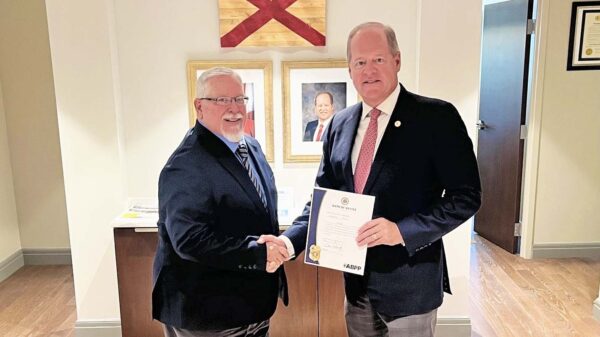The Alabama Senate on Thursday passed a bill that would lessen the amount of correctional incentive time, better known as “good time,” that incarcerated individuals would be able to receive while in state custody.
The vast majority of the state’s incarcerated population is currently ineligible for good time. The bill ostensibly tightens an already narrow window for incarcerated individuals serving in historically overcrowded and lethal correctional institutions to be released from their sentence early. It also adds specific offenses where individuals in state custody could lose their accrued good time, including homicide, assault, escape, and inciting a riot, among others.
Approximately 13 percent of those currently incarcerated are eligible for good time, according to Alabama Sentencing Commission executive director Bennet Wright on Thursday, who mentioned that the percentage of those eligible had increased since the end of the pandemic as more and more individuals being held in county jails return to state custody.
The inciting incident for the bill’s creation was the shooting death of Bibb County Sheriff Deputy Brad Johnson, as the suspect in the murder investigation, Austin Patrick Hall, had been released on good time served despite numerous infractions committed both inside and outside state custody that should have forfeited his good time. Hall had escaped a Camden Work Release Center in 2019, and assaulted a Calhoun County Sheriff’s Deputy the following year while incarcerated in the county’s jail.
While held in the Calhoun County Jail, Hall still received good time credit despite the increasing number of criminal charges against him. Hall was eventually released on bond in April of 2022, only two months prior to the deadly shootings in Bibb County.
A second Bibb County Sheriff’s Deputy, Chris Poole, was injured during the shooting in June of last year. Poole was present during deliberations on the bill on Thursday.
“This tragic situation revealed a flaw in our system that was literally lethal that day,” said state Sen. April Weaver, R-Alabaster, who is the bill’s sponsor in the Senate, on Thursday. “I believe we have an opportunity to correct that.”
Senate Minority Leader Bobby Singleton, D-Greensboro, who had expressed concerns about the bill during the previous day’s Senate Judiciary Committee hearing, offered a successful floor amendment to the bill that pulled from a failed substitute submitted earlier during the debate.
The changes, according to Singleton, included specified instances where an incarcerated individual may not have their good-time revoked: When they are defending themselves, as determined by the Alabama Department of Corrections, or when they are peacefully protesting. The changes were later approved by the body.
“If our parole board was releasing folk, I would have no real problem with this bill,” Singleton said on the Senate floor on Thursday. “If the parole is out, then the good time is not up, but the good time gets up because we’re not paroling anybody out.”
The bill passed 30-1, with Singleton as the sole “nay” vote in the chamber on Thursday. It now goes to the state House for consideration.
“The only thing the Senate approved today was fewer incentives and more time spent in Alabama’s unconstitutional, overcrowded prisons for incarcerated people,” said Dillon Nettles, the policy and advocacy director for the ACLU of Alabama, in a statement concerning the bill released on Thursday. “If signed into law, SB1 will only agitate an already chaotic and violent system that is harming all Alabamians, including the lives of people incarcerated and correctional staff.”























































